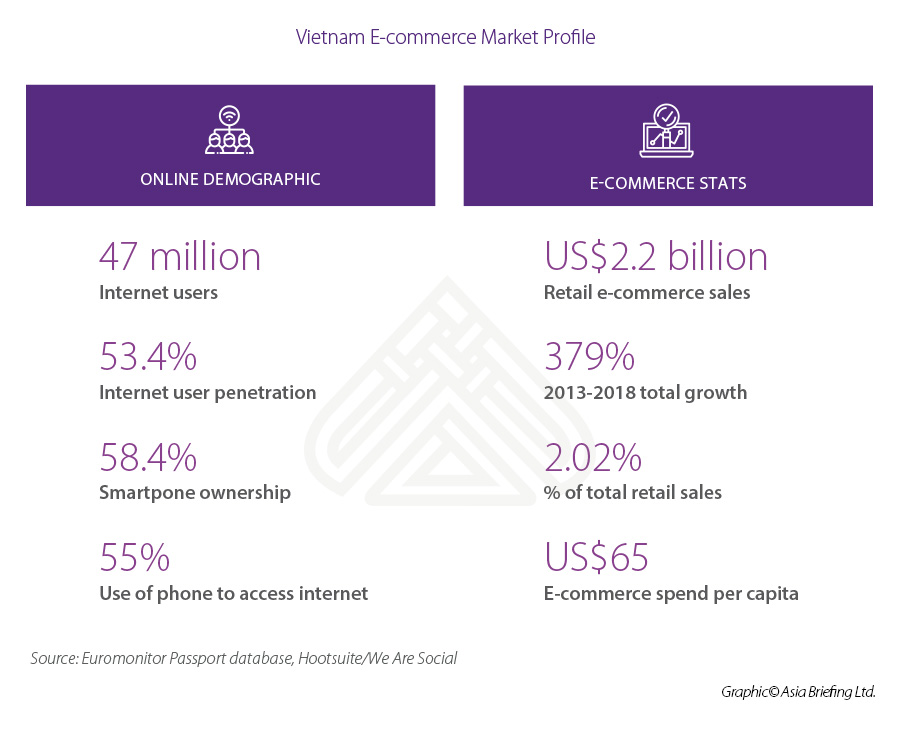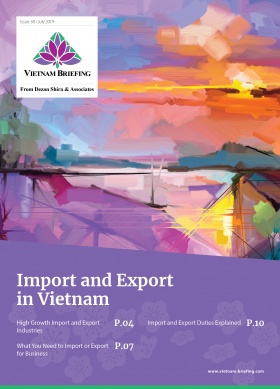E-commerce Logistics: Emerging Opportunities in Vietnam
- Vietnam’s e-commerce market is forecast to reach US$15 billion by 2025.
- The strong growth has created high demand for e-commerce logistics projected to grow at 42 percent every year until 2022.
- While the industry has its challenges, its growth is promising, with the government keen to remove regulatory hurdles faced by the industry.
Vietnam’s e-commerce market size is expected to reach US$15 billion by 2025. Vietnam is the second fastest growing e-commerce market behind Indonesia according to the e-Conomy report by Google and Temasek. This strong growth has set high demand for e-commerce logistics and the industry expected to reach an average growth of 42 percent every year until 2022. The industry was valued at US$103 million in 2018 according to market research firm Ken Research.
Vietnam’s growing e-commerce space
The market has witnessed the entrance of many large players in recent years, with lotte.vn and aeoneshop.com joining in early 2017 alone. In 2018, Amazon entered the Vietnam market to help Vietnamese small and medium enterprises (SMEs) export their goods. Yet, e-commerce extends beyond sales and slick web design.
The speed of product delivery is increasingly important as is the quality for both customers and merchants. As the market continues to grow, it becomes increasingly clear that the long-term prospects of Vietnamese e-commerce lie in the development of a good logistics system to facilitate the sector. Last-mile connectivity is crucially important for e-commerce businesses who know that customers expect fast and reliable deliveries.
Currently, several e-commerce platforms such as Lazada, Tiki and Grab have their own logistics department including warehousing, package, and shipping. Nevertheless, most firms involved in e-commerce cannot handle logistics alone, creating a demand for third-party logistic providers (3PLs). Firms such as Shopee and Sendo use 3PLs partners.
E-commerce logistic players
According to the Vietnam Logistics Business Association (VLBA), the logistics industry in Vietnam accounts for 20 to 25 percent of GDP with the sector projected to grow by roughly 12 percent every year in the near future. The high growth of the e-commerce industry offers more opportunities for logistics companies to tap into the market’s potential. In particular, express delivery and logistic services targeting e-commerce are fertile ground for investment.
In recent years, a number of notable companies have begun investing in logistics within Vietnam and help to showcase the success and opportunities which Vietnam can afford.
With the goal of tapping in to the field of e-commerce logistics, Indo Tran Logistics and ITL Corp’s Speedlink have entered into and provide services in the field of express delivery in Vietnam. SpeedLink now has operations in 50 provinces and cities across the country.
Giao Hang Nhanh, an e-commerce delivery and logistics business, caters to the country’s vibrant online stores. Giao Hang Nhanh currently serves over 800 online merchants, 20 of which are larger scale business-to-consumer (B2C) e-commerce sites such as Tiki. Its aim is to enable a better e-commerce experience for both consumers and merchants through efficient logistics service.
“Uber for logistics” is another area that has already seen immense potential for profitability as a means of bridging existing gaps in Vietnamese logistics networks. Grab, the Uber rival in Southeast Asia, recently announced a rebranding alongside a few new services which include delivery service (GrabExpress). Known locally for its ability to set trends within the Vietnamese market, it is likely that this model of logistics will gain momentum in the years to come.
Challenges faced by industry
While a growing sector, the logistics sector in Vietnam is not without its share of challenges. Firms such as Lazada that have their own delivery network have limitations. Even with its own logistics network in place, it has to rely on 3PL partners to fulfill orders underlining the demands of the growing e-commerce sector.
Aside from this, Vietnam is mainly a cashed based economy, with most transactions conducted using cash as payment. E-commerce firms are forced to rely on cash on delivery which leads to higher operational costs.
Firms also have to contend with products returned, exchanged or damaged. In addition, 75 percent of daily e-commerce orders are transacted in Hanoi and Ho Chi Minh City which have heavy traffic, further increasing costs.
Moreover, the legal framework and regulations covering the logistics sector remain difficult and complex. Last mile issues have to be addressed and shipping to the rural areas is challenging. These issues become more pronounced as companies seek to gain footholds outside of Vietnam’s first-tier cities, such as Hanoi, Ho Chi Minh City, and Da Nang.
Future prospects of e-commerce logistics
Despite facing major hurdles, the logistics sector has a positive future especially due to Vietnam’s free trade agreements. The Comprehensive and Progressive Agreement for Trans-Pacific Partnership (CPTPP) came into effect this year and the European Union Free Trade Agreement (EVFTA) is set to be ratified sometime next year. These FTAs will help promote FDI in Vietnam’s infrastructure and information system.
Beyond this, the government has passed legislation to improve regulatory hurdles faced by the industry.
These include Decision No.1012/QD-TTg on the development of logistics centers nationwide by 2030. Followed by Decision No. 200/QD-TTg which focuses on enhancing competitiveness and development of logistics services in Vietnam by 2025.
With the conditions for investment improving and regulatory reform ongoing, it is anticipated that capital expenditure from current investors will continue to rise in the years ahead and that new entrants will continue to consider the Vietnamese market for investment. The key to success for existing and prospective investors in e-commerce logistics will ultimately remain in maintaining a firm understanding of the challenges inherent in the Vietnamese market and finding the most cost-effective ways to provide solutions to these challenges.
Note: This article was first published in June 2017, and has been updated to include the latest developments.
About Us
Vietnam Briefing is produced by Dezan Shira & Associates. The firm assists foreign investors throughout Asia from offices across the world, including in Hanoi and Ho Chi Minh City. Readers may write to vietnam@dezshira.com for more support on doing business in Vietnam.
- Previous Article Vietnam’s IT Sector: 5 Industries to Watch
- Next Article Vietnam’s Auction Plan for Solar Energy








